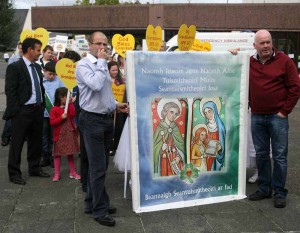
By Sarah Mac Donald - 09 September, 2019

Society’s tendency to value people according to their usefulness rather than for who they are as unique human beings has been criticised by the Bishop of Elphin.
In his homily for the Catholic Grandparents Association’s national pilgrimage to Knock Shrine, Bishop Kevin Doran said those most likely to be negatively affected by this tendency are those who are not directly involved in the production of wealth: children, the elderly and those who are sick.
“They are more easily regarded as a burden,” he said.
While slavery may have been abolished, it had not gone away, Bishop Doran warned. He said human trafficking is a reality in our society and many migrant workers are valued more for what they can do than for who they are.
“It doesn’t just happen to migrants either. Depending on the kind of relationships that operate in the workplace, people can find that they are used and then disposed of when they are no longer required.”
He said Irish society had been rightly been criticised for the way that unwanted or “inconvenient” children in the past had been treated.
“The circumstances may have changed, but the attitude has not really changed that much. At a time when there is far more focus on wanted children, and on children who are wanted almost at any cost, we have just found new and more permanent ways to dispose of children who are not wanted or who don’t measure up to our expectations.”
Referring to Pope Francis’ letter of encouragement Amoris Laetitia (The Joy of Love), he noted that the Pontiff had written, “Our elderly are men and women, fathers and mothers, who came before us on our own road, in our own house, in our daily battle for a worthy life… How I would like a Church that challenges the throwaway culture by the overflowing joy of a new embrace between young and old.”
Bishop Doran reminded the congregation in Knock that Pope Francis has spoken on many occasions in recent years about the sadness and the emptiness of a society that would put the elderly to one side.
“A society that has no room for the elderly or discards them because they create problems has a deadly virus – it is ‘torn from its roots’, the Pope has written.”
Elsewhere in his homily on Sunday, Bishop Doran noted that in recent years, Irish society has also discovered the contribution that grandparents can make to the economy.
“At a time when the cost of housing is very high and people travel long distances to work, the availability of lively, mobile and energetic grandparents makes it easier for hard-pressed mothers and fathers to take their place in the work force. Even if this means that children see less of their parents, it has certainly given rise to the possibility of rich relationships between children and their grandparents.”
But even in this situation there is a risk at times that the elderly can be valued more for what they can do than for who they are, he noted. “We need, as a society, to remember that being a grandparent is primarily a relationship, not just a function, and that it shouldn’t become a burden,” Bishop Doran said.
He also urged grandparents to support their grandchildren in developing positive attitudes which they will not pick up elsewhere.
“In your conversations with them, you can help them to value themselves for who they are and not simply for what they have or even what they achieve. You can help them to value their parents for who they are and not simply for what they provide. In the process, of course, you will also help them to see yourself for who you truly are.”
Bishop Doran said Pope Francis had spoken often about how children often hear the good news of the Gospel from their grandparents and how it is often grandparents who teach their grandchildren to pray.
“I have met young adults whose faith was not nourished by their parents, but who greatly value that wonderful gift that they received from their grandparents of being introduced to Jesus and to the life of the faith community.
“I have been very conscious in recent years, as I have celebrated Confirmation, how important grandparents are to children. It would be great if you could take an interest in what they are learning about their faith at school,” he suggested.